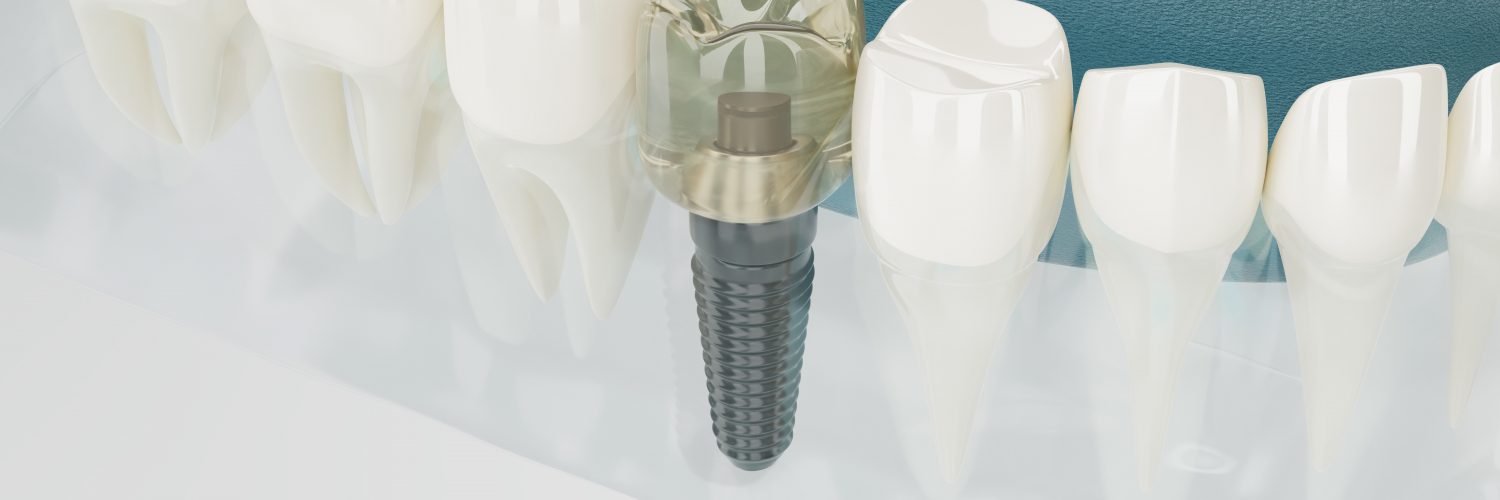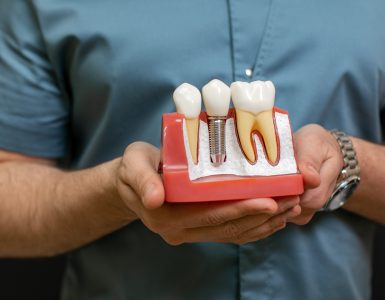More and more people are choosing to have dental implants to replace missing teeth. Naturally blending in with your natural teeth, dental implants offer a durable and long-lasting solution to tooth loss and provide many more benefits than just repairing your smile.
What is a dental implant?
A dental implant is a screw made of titanium that is implanted into the patient’s jaw replacing the root of the missing tooth. Being made of titanium, the implant is biocompatible and over time bone will grow around it helping to secure it in place. This provides a solid foundation for the new tooth and prevents bone loss. An artificial tooth or crown will be connected to the implant to fill the gap caused by the missing tooth. Implants are most commonly used for single teeth, but can also be used to anchor a dental bridge or removable dentures.
Who are they suitable for?
Whilst they are suitable for a broad range of people, there are some reasons why they may not be suitable for some. As the implant is integrated into the jawbone, the bone needs to be dense, sturdy and healthy enough to support it. Therefore, it is not recommended for someone with a small jaw, who has gum disease or some medical conditions. Because smokers are often susceptible to gum disease, they usually are not good candidates for a successful implant unless they are prepared to give up smoking. For those with existing bone loss, it is possible to perform a bone graft to strengthen the jaws ability to support an implant. Your dentist will be able to advise you whether or not you are a suitable candidate.
What are the benefits of having a dental implant?
- Long-lasting. If you maintain good oral hygiene, your dental implant could last a lifetime.
- Improved oral health. By integrating with your jawbone, chewing will stimulate bone growth just like your natural teeth. They will also support the placement of the surrounding teeth preventing movement and making maintaining your oral hygiene easier. Also, unlike dental bridges, no modification of the adjacent teeth is required in the process.
- Natural looking. Designed to blend in with your natural teeth, they will look and feel like you never lost a tooth.
- Improved facial structure. Tooth and bone loss can affect the shape of your face causing it to hollow and sag. A dental implant can eliminate these changes restoring its shape.
- Improved self-esteem. Missing teeth are often noticed when you smile. Improving your appearing and getting your smile back can have a big impact on your physical and mental health. Tooth loss can also affect your speech patterns, so being able to speak clearly again is great confidence booster.
- Easy to maintain. Treat them as you do your natural teeth with your normal daily brushing and flossing routine.
- Improved diet. Missing teeth can sometimes make chewing certain foods difficult. Because the dental implant integrates with the bone, it has the same bite strength and chewing capacity as your natural teeth.
Are there any risks?
If you have a healthy jaw, the risks are minimal as long as you maintain good oral hygiene before and after the procedure and the success rate is high. As the implant procedure involves oral surgery, you do need to be aware of the risk of possible infection, nerve or tooth damage, sinus problems, implant movement or potential rejection of the implant. It is normal to expect pain, swelling and some bleeding after the procedure. If you are a smoker, it is best to quit at least two weeks prior to surgery and refrain from smoking during the healing process to avoid implant rejection. A good dentist or oral surgeon will ensure any potential risk is minimised.
What is the procedure to have a dental implant?
Your new implant will not be available immediately as there are several steps your dentist will go through to complete the implant process. These stages will be completed over time to ensure proper healing, so you will need quite a few visits with your dentist.
- The first step is having x-rays and 3D images taken of your teeth and jaw. This allows your dentist to get a good idea of the health of your teeth and gums, whether you are a good candidate for the procedure, and placement of the implant. Any necessary tooth extraction will be attended to.
- If you do not have sufficient bone mass to support an implant, your dentist may suggest a bone graft. This is a procedure where bone is taken from another part of your body and transplanted into your jawbone. It will be necessary to allow time after this procedure for allow for healing.
- To insert the implant, the surgeon will cut the gum to expose the bone and will drill a hole in the bone to place the implant in. There are options to ease the pain of this process, usually by using a local anaesthetic, but your dentist will be able to advise you on the most suitable for you. A period of approximately six months is required to allow time for healing and the bone to grow into and attach to the implant. This process is called osseointegration.
- The next step is the placing of the abutment, to which the crown is attached. An abutment is the connection between the implant and the crown. The gum will need to be reopened to expose the implant. This metal abutment is screwed into the implant and the gum is closed around it. It takes a few weeks for the gum to heal before the crown is attached. Sometimes the abutment is attached at the time the implant is inserted.
- An impression or mould of your teeth and gums will be taken of the area so that your new tooth can be created with the right size, shape and colour to be a natural fit and match to your existing teeth.
- Once completed, the crown will be attached to the abutment, adjusted until it is in the perfect position and sits well with your teeth and jaw. It is then either cemented of screwed into place.
How do you maintain your implant?
Taken care of, your dental implant will last a lifetime. As with your natural teeth, it is important that you maintain good oral hygiene by daily brushing and flossing to ensure no bacteria causes plaque to accumulate around the teeth, gums and the metal implant. Attend regular visits with your dentist to check your implants are healthy and functioning as they should and, just as you should for your natural teeth, avoid chewing any hard foods that could break the crown.




